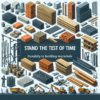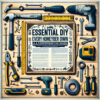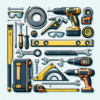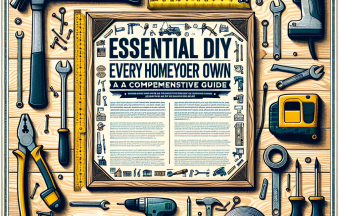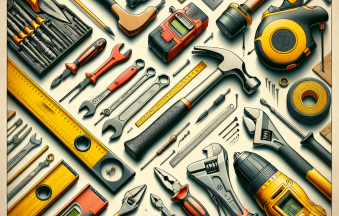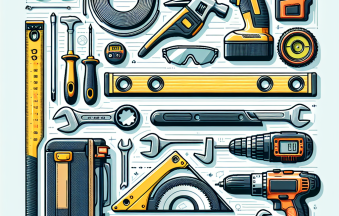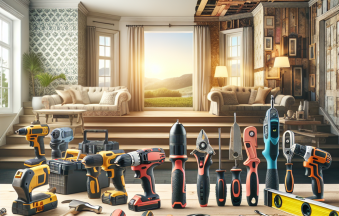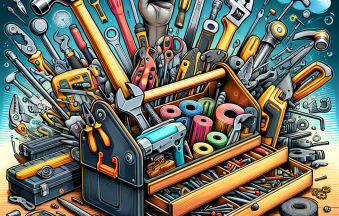Whether you’re an experienced DIY aficionado or just embarking on your home improvement adventure, having the appropriate tools at your disposal is vital. With the correct tools for DIY, you can handle anything from minor fixes to substantial renovation tasks. In this guide, we will delve into the primary classifications of DIY tools that every homeowner should contemplate, along with advice and recommendations for optimizing their use.
Household Tools
Household tools cover a wide range of instruments that assist in maintaining and enhancing your living environment. Consider your essential toolkit as a foundational element. A basic toolkit should comprise:
- Screwdrivers: A collection of flathead and Phillips screwdrivers can assist with numerous minor jobs.
- Hammers: A high-quality hammer is indispensable for driving nails and executing minor demolition tasks.
- Pliers: Needle-nose, slip-joint, and wire-cutting pliers cater to various gripping and cutting requirements.
- Utility Knife: Ideal for slicing boxes, ropes, or any material that requires a keen touch.
Construction Materials
When undertaking building projects, having the appropriate construction materials at your disposal can significantly impact the outcome. Basic construction materials include:
- Lumber: Depending on your project, different types of timber will be essential.
- Drywall: An excellent choice for interior walls, drywall is frequently used in renovations.
- Insulation: Crucial for energy efficiency, insulation plays a key role in temperature regulation.
- Concrete: Necessary for posts or foundations, knowing how to mix and pour it properly can be extremely advantageous.
Electrical Tools
If you’re comfortable handling electricity, you’ll require specific electrical tools to safely address wiring tasks:
- Wire Strippers: These enable you to easily strip insulation from wires, simplifying connections.
- Multimeter: Indispensable for measuring voltage, current, and resistance in electrical systems.
- Voltage Tester: An essential tool for verifying whether electrical current is present in a wire or device.
Fasteners & Hardware
No project is complete without appropriate fasteners and hardware. This may comprise:
- Nails and Screws: Stock a variety of shapes and sizes for diverse uses.
- Anchors: Utilizing wall anchors ensures that screws remain secure in hollow walls.
- Brackets and Hinges: Handy for supporting shelves or attaching doors and gates.
Kitchen & Bathroom
Renovating or enhancing your kitchen and bathroom can significantly boost your home’s market value. Essential tools and equipment you may require include:
- Pipe Wrenches: Necessary for plumbing chores, especially in the kitchen and bathroom.
- Caulking Gun: Ideal for sealing joints and gaps; it’s a straightforward yet efficient tool.
- Measuring Tape: Ensure that your appliances or fixtures fit perfectly in their designated spaces.
Light Bulbs & LEDs
When refreshing your lighting, comprehending light bulbs and LEDs can improve aesthetic appeal while promoting energy efficiency:
- Incandescent vs. LED: Choose LEDs for their longevity and energy-saving attributes.
- Smart Bulbs: These can be operated through your smartphone or voice commands, offering convenience.
Lighting & Fans
Lighting and fans are crucial for establishing a pleasant atmosphere and ensuring adequate airflow. Consider these tools:
- Floor Lamps: Excellent for providing additional illumination in living areas.
- Ceiling Fan Pull Chains: An often neglected detail is ensuring that ceiling fans have operational pull chains for user-friendliness.
Precision Tools
Every DIY task demands accuracy, which is where precision tools become essential:
- Tape Measure: Ensure precision with a dependable tape measure that retracts effortlessly.
- Level: Use a level to verify if surfaces are even, which is crucial for hanging shelves or cabinets.
- Square: A carpenter’s square is vital for creating right angles when working with wood.
Painting & Wall Supplies
Finally, whether you’re rejuvenating a room or embarking on a significant overhaul, painting tools are essential:
- Paint Rollers and Brushes: Fundamental for applying paint uniformly; select the appropriate size for your project.
- Drop Cloths: Safeguard floors and furniture from paint splatters using durable drop cloths.
- Painter’s Tape: Use this to attain clean edges and neat lines.
Equipping yourself with the appropriate DIY tools from these categories not only empowers you to undertake projects with assurance but also enhances your proficiency as a homeowner. With the right resources and an enthusiasm for creating, the opportunities for enhancing your home are limitless.



